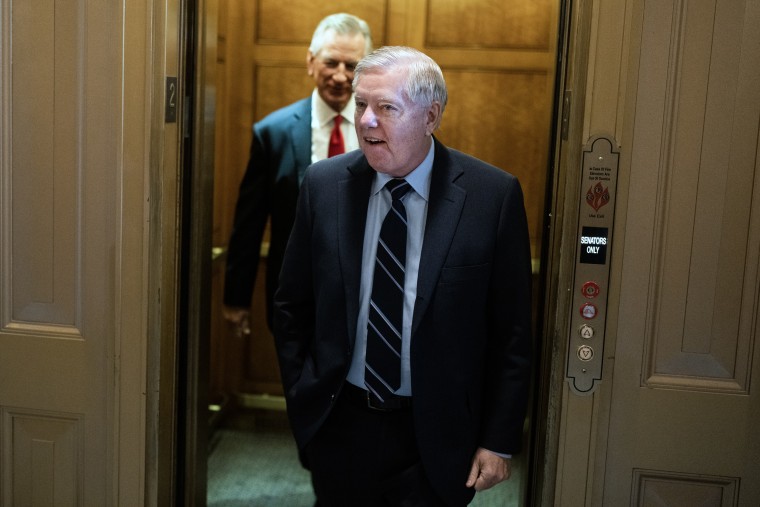Not since the 1930s has isolationist sentiment gained such prominence in the
In 1940, as Hitler’s troops rolled across Europe, a growing chorus of Republicans argued against sending American weapons to Britain.
The United States, they said, would be wasting resources sending help to London and instead Washington should put “America First.”
Now, former President Donald Trump and his allies in Congress use the same slogan to make similar arguments against sending military aid to another democratic country in Europe under assault by a powerful authoritarian regime.
“The American people deserve to know what their money has gone to. How is the counteroffensive going? Are the Ukrainians any closer to victory than they were 6 months ago?” more than two dozen Republican lawmakers wrote in a letter this month, declaring their opposition to additional U.S. military aid to Ukraine.
Not since the years before America entered World War II, when Ohio Sen. Robert Taft and others warned against giving a “blank check” to Britain, has isolationist sentiment gained so much traction in the U.S.
On Dec. 7, 1941, the Japanese attack on Pearl Harbor ended the debate about U.S. neutrality. More than 80 years later, the outcome of the deadlock in Congress over an aid package to Ukraine and this November’s election could decide whether America continues to play a leadership role in the world, or pulls back from its alliances and pursues a go-it-alone agenda.
As Ukraine marks two years since Russia’s full-scale invasion, Trump’s supporters in Congress continue to block a proposal to send more help to Ukraine, despite repeated pleas from Kyiv that its soldiers are dying because of shortages of ammunition. Some Republicans that had favored sending more help to Kyiv have shifted their stance, including even Sen. Lindsey Graham of South Carolina, an outspoken champion of Ukraine’s cause.

And Trump, the front-runner for the Republican presidential nomination, is once again questioning the value of NATO and casting doubts about whether the U.S. would fulfill its commitments to allies if he returns to the White House. Trump said earlier this month he would encourage Russia to “do whatever the hell they want” if it attacked a NATO country that didn’t spend enough on defense. And he has also said he would consider letting Russia “take over” parts of Ukraine in a possible deal to end the war.
“I do see many similarities between the views and arguments of the Taft Republicans of the 1930s and the Trump Republicans today,” said Robert Kagan, a senior fellow at the Brookings Institution think tank, who has written a series of books about the history of U.S. foreign policy.
“[In the 1930s], there was a fair amount of sympathy with Nazi Germany among American conservatives, who saw Hitler as a bulwark against communism just as Trump Republicans now look to [Russian President Vladimir] Putin as a great bulwark and leader against liberalism,” said Kagan, author of “The Ghost at the Feast: America and Collapse of World Order, 1900-1941.”
Similar to what some GOP lawmakers say about Ukraine’s prospects, Republicans in the 1930s argued that “Britain was certain to lose and that any weapons or money sent to Britain were wasted on a hopeless cause, with the money better spent at home,” Kagan said.
Trump’s relentless criticism of Ukraine, U.S. allies and international engagement generally — echoed by his supporters and right-leaning media outlets — appears to have had an effect on public opinion over the past three years, according to recent surveys and analysts.
In a new poll by the Chicago Council on Global Affairs, a stunning 53% of Republicans said it would be best for the future of the United States to stay out of world affairs rather than take an active role. It marked the first time in the 49-year history of the survey that a majority of Republicans adopted that view.
As for Ukraine, the share of Americans who say the U.S. is providing too much support to Kyiv has increased steadily since Russia’s full-scale invasion two years ago, particularly among Republicans, according to a Pew Research Center survey conducted in November and December.
Forty-eight percent of Republicans and Republican-leaning independents say the U.S. is delivering too much aid to Ukraine, while just 16% of Democrats and Democratic-leaning voters view the current level of assistance as excessive, the Pew survey said.

Not long ago, sending weapons to Ukraine to fight invading Russian forces would have been roundly embraced by the…
Read More: Not since the 1930s has isolationist sentiment gained such prominence in the

